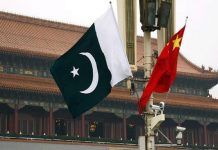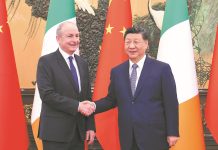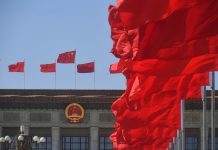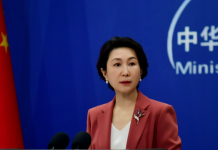By Asghar
Ali Mubarak
Islamabad: Experts while speaking to the participants of the webinar organized by the Institute of Regional Studies (IRS) on ‘Bangladesh-China Relations in the Changing Regional Dynamics’, urged to dispel apprehensions attached with the growing Chinese investments in Bangladesh. Relations between the two countries are based on mutual interests rather than being a stopgap zero-sum game.
Participants in the webinar discussed future prospects and challenges between the two countries. The panel of experts included Ambassador Naghmana A. Hashmi, Prof. Shahab Enam Khan from Jahangirnagar University of Dhaka, Prof. Lin Minwang from Fudan University and Dr. Sujit Kumar Datta from Chittagong University, Dhaka. Ms. Nabila Jaffer, Research Analyst at the IRS moderated the sessions.
Amb. Hashmi emphasized that the relationship between China and Bangladesh are steady and increasing. Since the enactment of the controversial Citizen Act by India, relations between Dhaka and New Delhi have turned apprehensive. Beijing-Dhaka ties cannot be impervious to the strategic shift of US tilt towards India to neutralize growing Chinese influence in the region.
Prof. Khan was of the view that big power tussle has always impacted bilateralism in South Asia. Bangladesh is aware of the apprehensions circulating in the media about growing Chinese investments. The increasing relationship is not a zero-sum game and there are greater prospects for Bangladesh. As far as India-Bangladesh ties are concerned, relations in future should be based on economic rather than strategic and security interests.
Prof. Minwang of Fudan University was of the view that Bangladesh is caught between two camps, emerging in South Asia. US and India on one side and China and Pakistan on the other.
The future relationships between the two camps could very well determine Dhaka’s line of actions in future.
Dr. Datta elaborating on the Chinese interest was of the view that Beijing is looking to enhance its geo-political and strategic relationship with Dhaka along with its economic ties. New Delhi could lose out if it did not change its attitude towards small states of the region and the continued growing tense ties between China and India will negatively impact on the economic situation of the region.
Concluding the session, Mr. Imran Sardar, Research Analyst at IRS stated that Dhaka will continue with its policies to maintain a workable balance in its relations with both China and India. This may not be that easy given the dynamics of power struggle in the region. Growth of Dhaka-Beijing relations would only be possible by reducing the apprehensions of Chinese domination. The future policy orientation of Dhaka could serve as a model for other smaller states to emulate in the turbulent South Asia Region.






